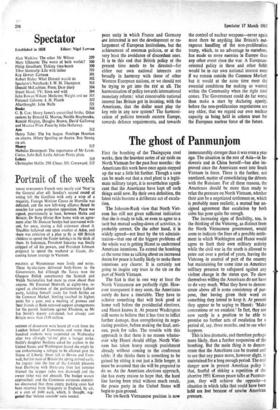The ghost of Panmunjom
First the bombing of the Thainguyen steel works, then the heaviest series of air raids on North Vietnam for the past four months: the Americans this week have once again stepped up the war a little bit further. Though a case can be made out that a steel plant is a legiti- mate military target, it is nevertheless signifi- cant that the Americans have kept off such things until now. By their own definition, the latest raids become a deliberate act of escala- tion.
The Johnson-Rusk view that North Viet- nam has still not given sufficient indication that she is ready to talk, or even to agree to a tacit but mutual scaling-down of activities, is probably correct. On the other hand, it is widely agreed—not least by the us adminis- tration—that one of the biggest problems of the whole war is getting Hanoi to understand American intentions. To extend the bombing at the same time as talking about an increased desire for peace is hardly likely to make these intentions any clearer. It is certainly not going to inspire any trust in the us on the part of North Vietnam.
The fact is that in one way at least the North Vietnamese are perfectly right. How- ever transparent it may seem, the Americans surely do have a timetable. They have to achieve something that will look good at home well before the presidential elections, and Hanoi knows it. At present Washington still seems to believe that it has time to inflict further damage, thus strengthening its nego- tiating position, before making the final, seri- ous, push for talks. The trouble with this approach is that there is no reason whatso- ever why Hanoi should oblige. North Viet- nam has taken heavy enough punishment already without coming to the conference table; if she thinks there is something to be gained by sitting it out just a little longer, it must be assumed that she will be prepared to do so. As the American elections approach. she has every reason to hope that, the hard line having been tried without much result, the peace party in the United States will begin to gain ground.
The us-South Vietnamese position is now immeasurably stronger than it was even a year ago. The situation in the rest of Asia—in In- donesia and in China herself—has also im- proved since the Americans went into South Vietnam in force. There is the further, not unrelated, matter of consolidating the détente with the Russians. For all these reasons, the Americans should be more than ready to relax the pressure on North Vietnam, whether their aim be a negotiated settlement or, which is probably more realistic, a mutual but un- signed agreement that escalation by both sides has gone quite far enough.
The increasing signs of flexibility, too, in the thinking of the Vietcong, as distinct from the North Vietnamese government, would seem to indicate the lines of a possible settle- ment in which Washington and Hanoi would agree to limit their own military activity while the civil war in the south is allowed to peter out over a period of years, leaving the Vietcong in control of part of the country but maintaining for some time an American military presence to safeguard against any violent change in the status quo. To show themselves willing the Americans do not have to do very much. What they have to demon- strate above all is some consistency of pur- pose, that having given their word on something they intend to keep it. At present they appear to be saying to Hanoi: 'Make concessions or we escalate.' In fact, they are now surely in a position to be able to promise no further acts of escalation for a period of, say, three months, and to see what happens.
This is less dramatic, and therefore perhaps more likely, than a further suspension of the bombing. But the main thing is to demon- strate that the Americans can be trusted and to see that any peace move, however slight, is maintained for a long enough period. The real danger now in present American policy is that, fearful of risking a repetition of the abortive 1951 Korean peace talks at Panmun- jom, they will achieve the opposite—a situation in which talks that could have been held are lost because of unwise American pressure.






























 Previous page
Previous page